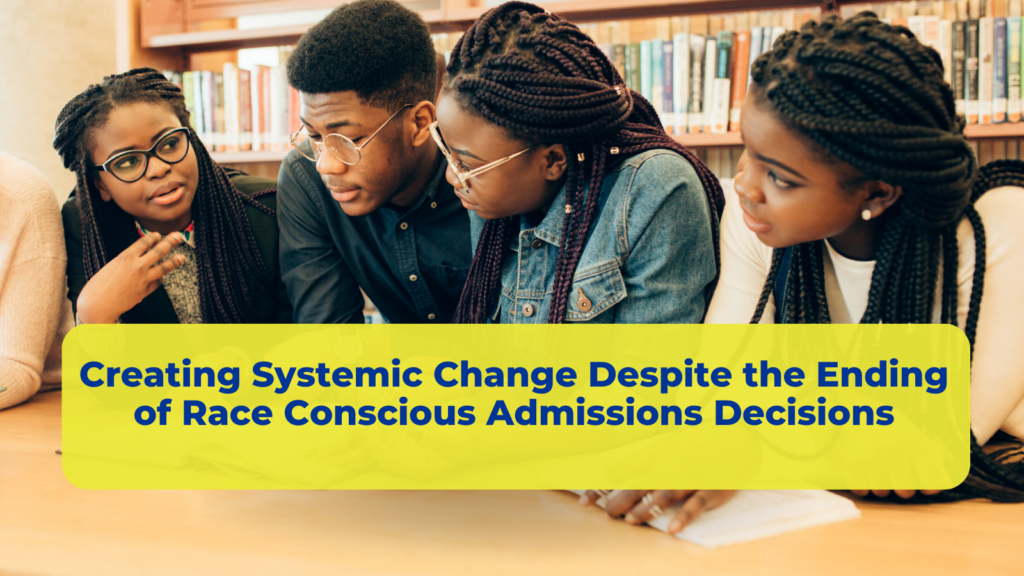Stay In Touch
Give us your email and we'll keep you in the loop on the latest STEM Push News.
Focusing the work is a set of evidence-based practices for pre-college programs to effectively support students on a path to STEM postsecondary education. Our quality standards help programs reflect and plan, help us see Network needs and assets, and help us benchmark progress over time.
Explore Our Quality Standards
Developed in 2019. Published in the Journal of STEM Outreach in 2025.
Formal program goals include broadening participation of underrepresented minoritized students in STEM undergraduate college programs.
Program goals reflect an intentional focus on building students’ connection to a STEM community.
Program goals demonstrate a deliberate effort to develop students in STEM Competencies.
Program goals reflect exposure to and development of familiarity with college planning, college life and resources available on campuses.
The program intentionally and effectively recruits underrepresented minoritized students. (Overall assessment of recruitment practices.)
Recruitment strategies reach into spaces frequented by minoritized students in the program’s feeder area.
Recruitment practices demonstrate STEM fields’ relevance to minoritized students’ interests, cultures, and identities.
Recruitment practices go beyond self-selection to include active identification and referral from organizations and individuals who have regular contact with the population of potential program participants (e.g., counselors, parents, community members, peers, schools, community groups).
Recruitment strategies employ a variety of messages and methods aligned with common communication mechanisms used within the underrepresented minoritized communities from which the program is trying to recruit.
The program utilizes well-trained, consistent staff and/or volunteers who demonstrate cultural competence and have appropriate expertise given the program goals.*
There are measurement routines and tools in place for continuous program improvement efforts around areas such as recruitment, program implementation quality, student/parent satisfaction, and outcomes attainment.
Program has articulated curriculum (activities and experiences) driven by its established goals for students.
3.3.1 Program is focused on rigorous STEM content.
3.3.2 Program content is reflective of advances in applicable STEM fields.
Program utilizes culturally responsive practices and approaches that engage, energize and empower students in their own learning. (Overall assessment of culturally responsive practices).
3.4.1 Program environment, activities and policies promote understanding of and respect for the cultural backgrounds of youth and their families.
3.4.2 Activities stimulate positive STEM identities and sense of belonging in both STEM community and on college campus.
Program utilizes research-based instructional practices aligned with what is known about how people learn.
Program is implemented in ways that broaden students’ understanding of and first-hand experience with college campus and culture, STEM careers, STEM professionals, and STEM workplaces.
Program implementation includes effective formation and sustaining of meaningful connections to students’ families and communities.
Program sustains a network of peers and program alumni to serve as an ongoing STEM resource for student participants.
Program utilizes practices that proactively identify and address barriers to participation (these may include transportation, cost of participation, meals, social- emotional, and/or other barriers).
Program includes responsive support for students based on needs identified at application and/or during program implementation (these may include tutoring for STEM content, study skills, professional communication skills, social-emotional support, etc.).
Program provides age-appropriate college advising and supports (these may include letters of recommendation, financial aid resources, application process, etc.).
Valid and reliable assessment practices are in place to measure student growth with regard to targeted outcomes. (Please respond to this standard with respect to the outcomes you listed above).
Program can demonstrate meaningful student growth with regard to targeted outcomes for at least three of the last five years. (Please respond to this standard with respect to the outcomes you listed above).
Program has a method to track alumni college enrollment, persistence and attainment and, specifically, rates for STEM majors.
Program can demonstrate improvement trends in college enrollment in STEM fields by program alumni over three or more program years or cohorts of students.
Program has established methods to engage parents/guardians in ways that provide support, guidance, and/or access to resources with regard to college pathways.
Program has established pathways to other experiences and/or programming that act as a bridge to STEM college opportunities (e.g., internship with STEM employer, preference for admission to another STEM precollege program, etc.).
For programs serving high school students, there is an established relationship with at least one college admissions department that provides some benefit to program alumni in the admissions process.
Through learning and adaptation from use with STEM PUSH pre-college STEM programs, the STEM PUSH Network presents this evidence-based self-study tool. It is designed for use in out-of-school time spaces and organizations that share common goals around broadening participation in STEM.
Created in 2024 and first presented at the ARIS Summit in April 2024.
**Note: This resource is in Google Sheets format to support quick implementation. Click the link, select “Make a Copy” and edit a duplicated version of the spreadsheet. Then, we’d love to hear what you think to help us learn and improve this tool by filling out a brief survey (linked from the START HERE tab).

Join Us for a Conversation about Equity, STEM & College Admissions
Wednesday, October 11 at 1:00 p.m. ET
Give us your email and we'll keep you in the loop on the latest STEM Push News.